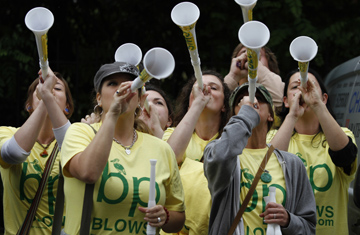
Demonstrators from the group Vuvuzelas for BP blow their horns during a protest across the street from the BP headquarters in central London on Tuesday, July 13, 2010
If you thought things couldn't get any worse for BP, think again. Three months after the Deepwater Horizon explosion caused up to 184 million gal. of oil to spill into the Gulf of Mexico, BP thought it had finally managed to stop the flow on July 15 — until company and U.S. officials cautioned on Sunday, July 18, that while the cap is holding, there are signs of possible leakage on the sea floor. And BP is already facing cleanup and legal bills to the tune of $60 billion. But a company worth $350 billion can survive a hefty financial hit. The damage to BP's image, however, is far more costly — and will take much longer to fix.
A lot of the blame, say public-relations experts, falls on BP's executives. "It's astonishing in today's media-savvy world that such a colossal and ongoing p.r. mess can be made," says James Herring, co-founder of the London public-relations firm Taylor Herring. "It's left people in the p.r. industry scratching their heads." BP had a public nightmare on its hands the moment the rig blew up on April 20. Since then, say experts, the company has exacerbated its situation with critical missteps that could affect it for years to come. "The brand-image costs will be there for a long, long time," says Nirmalya Kumar, professor of marketing at the London Business School. "For years, the first thing people will think about when you say 'BP' is the spill."
Among BP's blunders, says Kumar, was its ignoring what he calls "the four c's" crucial to crisis management: candor, compassion, commitment and contrition. Here, according to Kumar and Herring, are BP's biggest p.r. mistakes so far — and how the company can fix them:
Downplaying the news: Until the disaster became too big to ignore, BP downplayed it so much that some people might have missed the news altogether. On April 27, a week after the Deepwater Horizon exploded, BP released its earnings statement for the first quarter of 2010, with news of the disaster stuffed into three sentences at the bottom of page 4, underneath several paragraphs about acquisitions and a rocketing 135% profit increase over the previous quarter. It failed to mention that 11 workers had been killed in the explosion. One of the three sentences about the accident read, "BP is committed to doing everything in its power to contain the environmental consequences of the incident." But the statement offered no information about how serious the incident was. So much for candor.
Being tone-deaf: Even after the scale of the disaster became clear, BP seemed unaware of the depth of anguish about the explosion. "There was a complete misjudgment of public sentiment," Herring says. As an example, he points to the moment on May 30 when BP CEO Tony Hayward told reporters in Louisiana, "I would like my life back." Despite the furor that remark caused, a month later — with the well still spewing oil into the Gulf's waters — Hayward was photographed vacationing on his yacht during a race off England's Isle of Wight. A BP spokesman said Hayward was "spending a few hours with his family ... I'm sure everyone would understand that." They did not. Herring believes the yacht image "derailed" BP's attempts to get its public relations back on track. In comparison, Kumar and other public-relations experts cite Johnson & Johnson as a model for companies to follow: in 1982, when Tylenol Extra Strength tablets were discovered to be tainted with cyanide, Johnson & Johnson executives attended the funerals of the seven victims and were filmed weeping at the gravesides. That's the type of compassion BP has been seen to lack.
